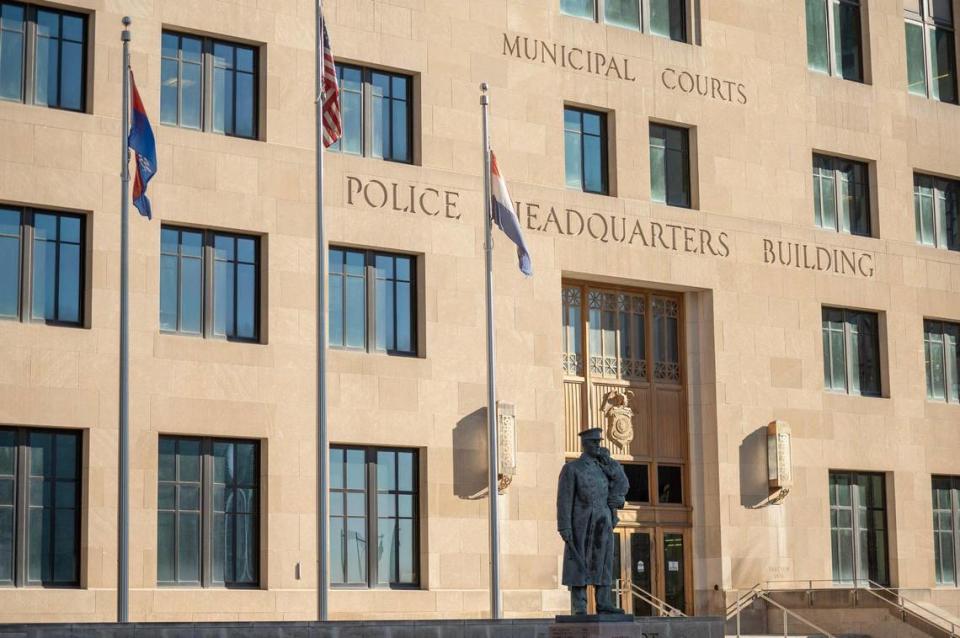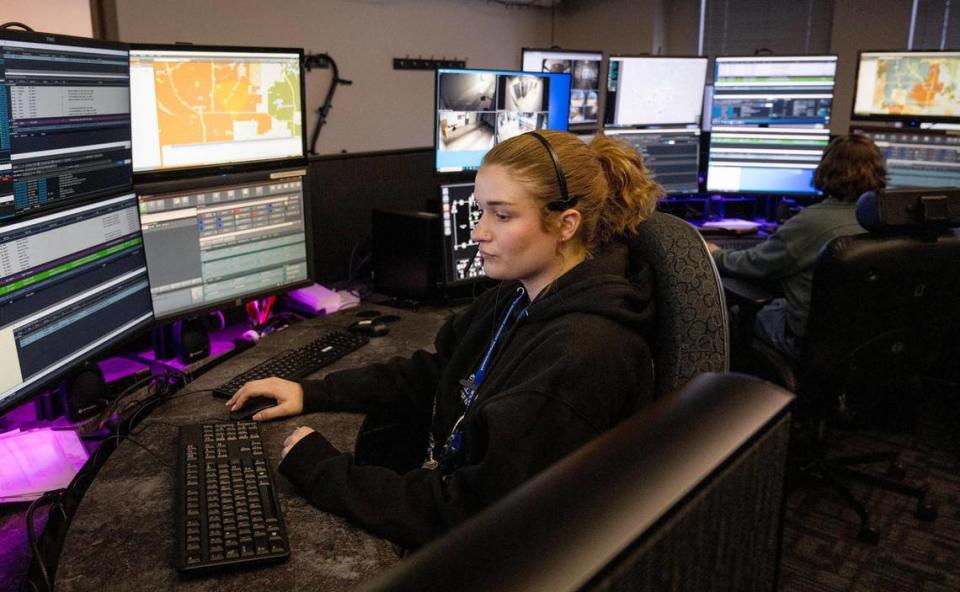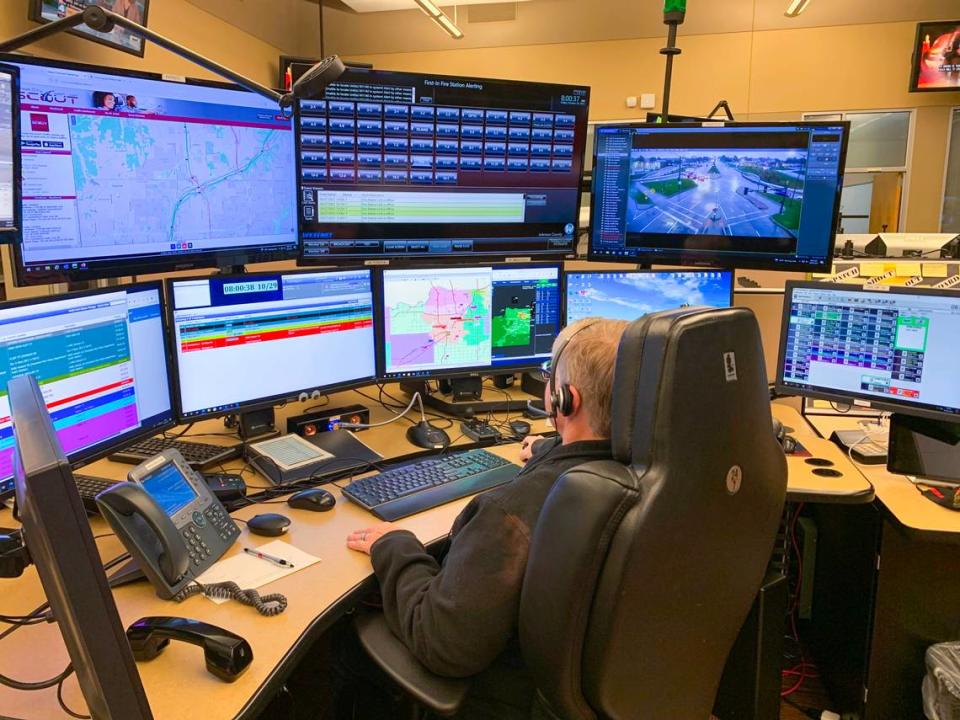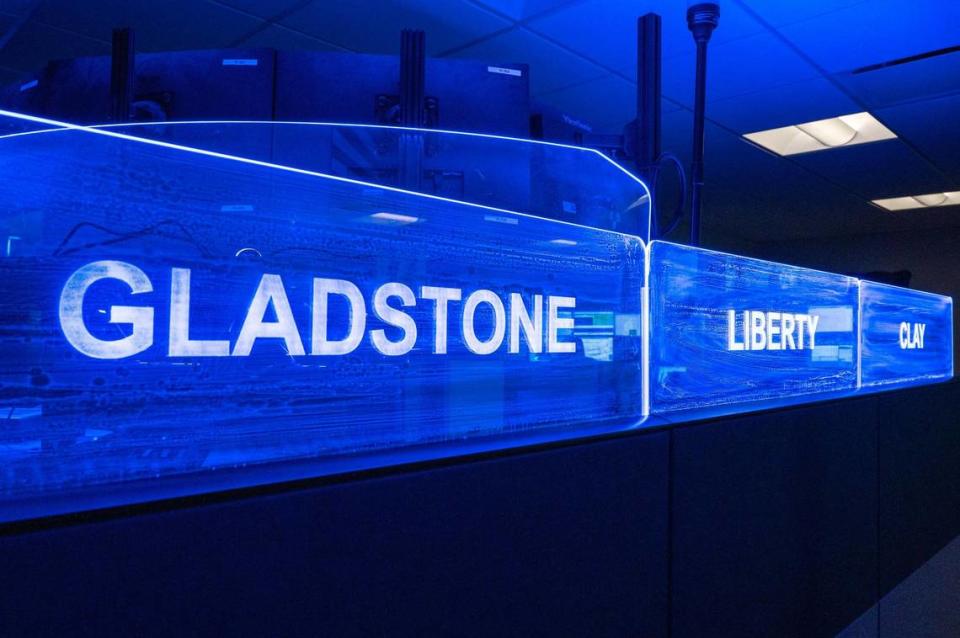KCPD is only local agency falling below national 911 standards. Would higher pay help?
- Oops!Something went wrong.Please try again later.
Reality Check is a Star series holding those in power to account and shining a light on their decisions. Have a suggestion for a future story? Email our journalists at RealityCheck@kcstar.com.
As Kansas City looks to solve its problem of long 911 hold times, a question has been raised.
Is the Kansas City Police Department paying enough to solve the staffing problem it says is behind the long wait times?
The police department is the only public safety agency in the metro area that fails to meet national standards when it comes to answering 911 calls. The department has long explained that by pointing to a lack of workers. Its communication unit has had dozens of unfilled positions for months and has been talking about the problem for years.
To understand how the staffing problem might be influenced by the starting pay offered to the employees answering the 911 calls, The Star reached out to several public safety agencies in the regional 911 system to compare with Kansas City Police.
Kansas City, at $20.48 an hour, fell on the lower end of starting salaries among the public safety agencies The Star asked for information.
The Clay County Sheriff’s Office last year increased the starting annual salary for its dispatchers, who both take and dispatch calls, to $55,000, said Sarah Boyd, a spokeswoman for the Clay County Sheriff’s Office. That translates to about $26.44 an hour — almost $6 an hour more than Kansas City.
Shawnee pays dispatchers a minimum starting salary of $49,617, said Emily Rittman, public safety information officer for the city. That’s about $25.79 an hour.
Other agencies that pay more than Kansas City include the Overland Park Police Department, at $24.81 an hour, the Johnson County Emergency Communications Center at $22.73 an hour, the Lenexa Police Department at $22.19 an hour, and the Kansas City, Kansas, Police Department at $21.27 an hour for call takers and $22.50 an hour for dispatchers, according to spokespersons for the agencies.

As of April 1, pay for 911 call takers in Kansas City, Kansas, will increase to $21.91 an hour while pay for dispatchers will increase to $23.18 per hour.
Other agencies have lower starting salaries, including Independence Police Department at $20.18 an hour, the Jackson County Sheriff’s Office at $19.08 an hour, Lee’s Summit at $18.46 an hour for call takers and at $21.30 an hour for dispatchers, and Blue Springs at $17.59 an hour, according to their spokespersons.
Some agencies offer bonuses. The Overland Park Police Department offers $500 to start training, $500 to finish training and $500 for completing the probationary period, said Officer John Lacy, a police spokesman.
The Johnson County Emergency Communications Center offers emergency communications specialists a sign-on bonus up to $4,000 — $2,000 after six months with the employee’s completion of either the call taking or dispatching positions and $2,000 after 12 months with the employee’s completion of communications training program for both call taking and dispatching, said Kate Dorsey, operations manager.
The Independence Police Department offers dispatchers a $10,000 signing bonus for qualified applicants, said Officer Jake Taylor, a police spokesman.
Shawnee offers a $500 bonus, said Emily Rittman, public safety information officer for the city.
Although Blue Springs does not have a signing bonus, the police chief is allowed to give credit up to five years of previous experience to bring in employees at appropriate pay levels, said Jennifer Brady, a spokesperson for the department.

Kansas City’s worsening 911 problem
Kansas City’s 911 problem isn’t new.
For several years, Kansas City police have failed to meet the National Emergency Number Association call answering standards, according to data from the Mid-America Regional Council.
It’s a problem public officials have sounded alarms about before, including last May when Mayor Quinton Lucas said his sister was on hold with 911 dispatchers for five minutes before getting help for their mother.
Last June, a victim of a brutal assault outside Kansas City’s Arrowhead Stadium waited over four minutes in the 911 queue before being transferred to a call taker.
A man who reached out The Star relaying his own experience waiting on hold for 911 did not want to be named in this story but asked whether higher pay would help fill the Kansas City Police Department’s staffing needs.
“Having to be on hold for a 911 call is just ridiculous,” the reader said.
Meanwhile, Kansas City’s problem is just getting worse.
Targets set by the national group encourage 90% of calls to be answered within 15 seconds and 95% answered within 20 seconds.
Last May, just under 41% of Kansas City’s 911 calls, or two out of five, were answered in 15 seconds, according to the Mid-America Regional Council.
The numbers rebounded some by the end of the year, but still remained far below the national standards. In February, the latest month available, 65.4% of 911 calls handled by the Police Department were answered within 15 seconds.
In contrast, every other agency in the regional 911 system met the national standards in February, including the Kansas City Fire Department at 93.2%, Overland Park Police Department at 99.1% and the Kansas City, Kansas, Police Department at 99.4%, according to data collected by the Mid-America Regional Council.
Staffing shortage, growing call volume
For several years, police have blamed the extended 911 hold times on staffing shortages and increased 911 call volumes.
That was the case in May 2017, when James Dale Cavanaugh was killed during a comic book theft at Kansas City’s historic Clint’s Comics.

Then, the first person to call 911 waited six minutes and 25 seconds before a call taker answered, according to Police Department records. At the time, police said a lack of staff caused the delay.
That continues to be the case today. The Kansas City Police Department’s communication unit is authorized to have 109 positions, but had 28 vacancies in January, the same number of vacancies reported in June.
It has 25 call takers along with six trainees, and 35 dispatchers with one trainee, according to Capt. Jake Becchina of the Kansas City Police.
Under Kansas City’s system, call takers and dispatchers have two distinct roles, according to information provided by police.
Call takers answer incoming emergency and non-emergency calls and ask questions to determine the reason for the call. Dispatchers, on the other hand, handle self-initiated officer activity, vehicle and foot pursuits, and the dispatch of officers on calls based on the priority of the call.
Possible 911 solutions
Police didn’t specifically address call taker and dispatcher pay in its budget request submitted in October.
But it asked for a 4% increase for all professional staff with a 5% increase for those on the highest-step pay scale, said Officer Alayna Gonzalez, a spokeswoman for the department.
If approved, any increase would be reflected in the new budget year effective May 1.

During his fifth State of the City Address last month, Mayor Lucas said he proposed $2,500 hiring and retention bonuses for all 911 call takers and dispatchers to address the police department’s lagging 911 hold times problem.
“We have to have call takers who answer 911 when our residents call,” Lucas said. He also proposed the incentive be applied to other civilian employees of the police department. Lucas also proposed pay raises for all Kansas City police officers and a 30% bump in the starting salaries for new officers.
The department is also conducting a study to help address a variety of difficulties it is facing, including staffing, Gonzalez said.
“I can say with confidence, competitive salaries will assist with employment interest and assist with employee retention, which is why we are conducting this staffing study to help come up with a solution that will make the Kansas City Police Department stand out as a great place to start a career,” Gonzalez said.
While compensation plays a large role, other things like scheduling and vacation time also contribute to the department’s ability to attract and retain workers, Gonzalez said.
To help mitigate staffing shortages, the Police Department is offering overtime to officers to train with call takers and take 911 calls to help cut down on hold times, Gonzalez said. New hires waiting to begin training are being offered to start immediately by shadowing call takers and dispatchers, as well as riding along with patrol officers before their class starts.
The department continues to explore several different options for solving problems with 911 hold times, including a system launching this week that automatically calls back numbers after people hang up.
Police are also looking at an an auto-attendant system that asks 911 callers if they were trying to reach police, the fire department, emergency medical services or non-emergency assistance and routes the call to the appropriate agency.

Misuse of 911
Kansas City police say growing call volumes, including the misuse of 911, also leads to an increase in hold times.
The police department is the primary agency handling 911 calls in Kansas City. Its call takers ask callers if they have a police, fire, or medical emergency and then route the call to the proper agency.
Kansas City police handle the largest call volume among all primary agencies in the metro.
In December, around 44,000 911 and around 36,000 non-emergency calls were made to the city’s system. The next busiest was the Kansas City, Kansas, Police Department with slightly more than 11,000 911 and around 14,000 non-emergency calls, according to data from the Mid-America Regional Council.
“One of the biggest things we are struggling with is the misuse of 911 leading to an increase in hold times and an overwhelming number of calls coming through to our dispatchers,” Gonzalez said.
When asked whether that would be true for other agencies in the metro that are still able to meet national standards, Gonzalez referred that question to the Mid-America Regional Council, saying Kansas City police would not be able to speak on some of the challenges the other agencies may be facing.
The Mid-America Regional Council doesn’t have data on how many calls to 911 are non-emergency, according to Catherine Couch, public affairs coordinator with the Mid-America Regional Council.
As the coordinating agency for the regional system, MARC’s primary role is making sure calls get to the public safety answering points, Couch said. The agency doesn’t have insight into the calls once they are delivered.
What does make Kansas City different is that it handles a large volume of calls, Couch said.
To avoid misuse of 911 for non-emergencies, callers are asked to dial 311, the city services hotline, for issues that are not related to law enforcement, 988 for the suicide and mental health assistance hotline, and 211 for United Way’s hotline for housing and financial assistance.
“If more Kansas Citians were aware of what numbers to call for a non-emergency situation, our 911 hold times would drop significantly,” Gonzalez said.


